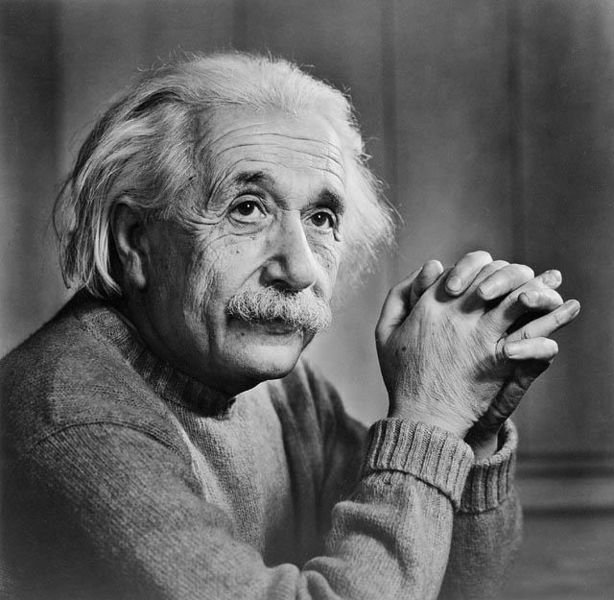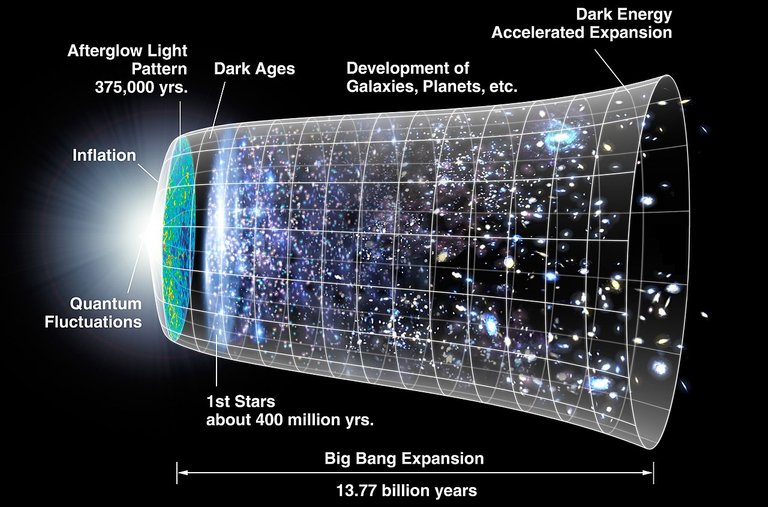
"I believe in Spinoza’s God who reveals himself in the orderly harmony of what exists, not in a God who concerns himself with the fates and actions of human beings." -Albert Einstein
Einstein made it clear he does not believe in a personal God, but he made repeated references to God, making it clear he was not an Atheist. Predictably, this has heated controversy between religious believers and atheists. So what exactly was Einstein's view on God? To understand this we will look at a philosophy introduced by Spinoza termed Pantheism.
Pantheism itself is not a religion, but simply the fundamental idea that "Everything is God." Spinoza used the label "God" to explain the interconnected nature of the universe. So in other words, God is the universe itself, and everything within the universe is an expression of God. This concept can be looked at from the perspective of the Big Bang.

Everything in the Universe came from a single source called the initial singularity. The initial singularity is the single all-encompassing point of potential from which the Big Bang was derived. If we can look at the initial singularity as the source of the entire universe, then through Pantheism, the singularity, the universe, and everything in it is labeled as "God."
Pantheism is an open-ended concept and can go in many different directions as to what the cause and purpose of the universe are. It can be traced back to ancient Eastern philosophies such as Advaita Vedanta and is still a relevant modern scientific perspective.
Some Pantheists believe consciousness is fundamental and persists beyond human life; Others believe our lives are purely physical and consciousness is a byproduct of the brain. The broad range of beliefs implies many Pantheists will not see eye to eye, but the core principle remains the same.
.jpg)
"Reality is merely an illusion, albeit a very persistent one." -Albert Einstein
E=MC² is one of Einstein's most popular discoveries that proved matter and energy to be interchangeable. It shows us that all matter is really just energy. Einstein's work has laid the foundation for modern quantum mechanics. He discovered quantum entanglement, which has shown us that two particles once entangled stay connected regardless of the distance between them. The behavior of these particles once entangled precisely correlate with one another, even if positioned on opposing sides of the universe.
Quantum mechanics, through the double slit experiment, has shown us that the state of an electron is manipulated by the observer. It behaves the way it is expected to behave until it is no longer being observed. Nothing we perceive is really the way it seems to be. As Einstein said reality is an illusion.
Einstein spent his last days working on a final theory he termed the Theory of Everything. He theorized the laws that govern the entire universe could be simplified into one fundamental equation. He saw the governing force behind nature was interconnected, orderly, and harmonious. This was how Einstein perceived God, that God is everything. He ran out of time, but with dedication and conviction in proving his beliefs, Einstein spent his final breaths attempting to solve the Theory of Everything.
"My religiosity consists in a humble admiration of the infinitely superior spirit that reveals itself in the little that we, with our weak and transitory understanding, can comprehend of reality. Morality is of the highest importance — but for us, not for God." -Albert Einstein
Congratulations @n8borealis! You have completed the following achievement on Steemit and have been rewarded with new badge(s) :
Click on the badge to view your Board of Honor.
If you no longer want to receive notifications, reply to this comment with the word
STOP